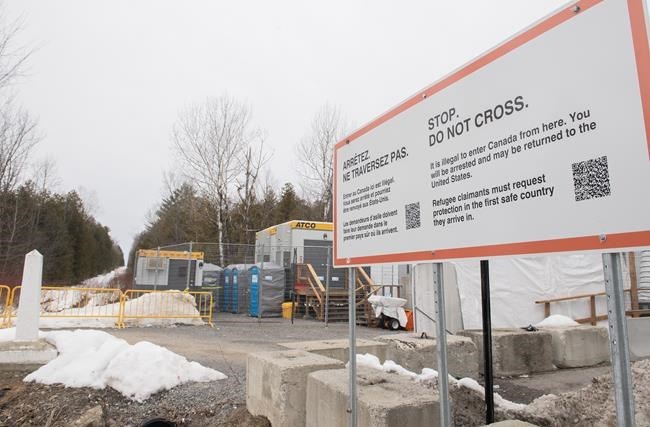MONTREAL — About 12 hours after the closure of a rural southern Quebec road used by thousands of asylum seekers to enter Canada from the United States, Evelyne Bouchard witnessed RCMP agents escort a family of four people off her property.
Bouchard, whose farm is located about two kilometres from the forested pathway known as Roxham Road, says she is used to seeing police around her home; at times, she has found clothing and unknown footprints in the snow on her Hemmingford, Que., property.
In a recent interview, she said it was upsetting to see people being taken away so soon after the Canada-United States immigration deal closed Roxham Road to most would-be refugees.
"It's that contrast," she said. "This is like my happy place — my home. I love this place, and to think that someone in that same kind of physical space is feeling afraid and vulnerable and is possibly in danger is just completely heartbreaking."
Officials say the massive wave of would-be refugees crossing into Canada has slowed significantly since the end of March, when the government negotiated a deal with the United States to turn away asylum seekers at unofficial border crossings like Roxham Road, closing a long-standing loophole in the Safe Third Country Agreement.
That agreement assumes that Canada and the U.S. are "safe" countries for would-be refugees. It also forces asylum seekers to apply for refugee status in the first country they enter — Canada or the U.S. — and prohibits them from crossing the border to file a claim.
Estelle Muzzi, mayor of border community St-Bernard-de-Lacolle, said residents who live near Roxham Road have reported a decrease in foot traffic in the area since the treaty was expanded.
"The message is getting through because I'm told that it's gone down dramatically — there's a big drop in traffic," Muzzi said in a recent interview.
"I think that for the citizens of St-Bernard-de-Lacolle who were very affected by the situation, those who live right next to the border, for them, the most important thing was to find some peace and quiet," Muzzi said.
Frances Ravensbergen, an activist with Bridges Not Borders, a refugee advocacy group in Hemmingford, said local volunteers have also reported a decline in the number of people arriving to cross through Roxham Road.
"The few people that we have seen crossing either don't seem to be completely aware of the new regulations … and not realizing that if you're handed back to the Americans, you may never apply for asylum again in Canada," Ravensbergen said in an interview.
But despite the drop in people arriving at Roxham Road, Ravensbergen said she thinks scenes like the RCMP arrest on Bouchard's property will be replicated across the country. Now that asylum seekers are blocked from using that road, they will likely try to enter Canada through other spots along the 9,000-kilometre border that separates the two countries, she said.
Border officials are also reporting a drop in the number of migrants trying to cross the border between official ports of entry. The Canada Border Services Agency said that from March 25 to April 2, it recorded 191 cases of people crossing irregularly. Out of that total, 144 claimants were returned to the U.S. in accordance with the expanded agreement; 54 were deemed eligible to make an asylum claim in Canada.
Before the new treaty went into effect, the government reported that since December of 2022, about 4,500 people were crossing through Roxham Road every month.
Now, the CBSA said that when RCMP agents or local police intercept would-be refugees trying to cross at irregular checkpoints, they take them to a designated — and official — port of entry. There, border officials determine whether or not their claim is eligible.
An asylum seeker is permitted to cross an irregular checkpoint under four circumstances: they have family members living legally in Canada; they are an accompanied minor; they have legal documents such as a Canadian visa or valid work permit; or their application for refugee status is considered in the "public interest."
"If an individual does not meet an (agreement) exception or is otherwise determined inadmissible, they will be removed to the U.S. If the refugee claim is eligible, the person's file will be referred to the Immigration and Refugee Board for consideration, and the person will be authorized to enter Canada to pursue their claim for protection," Maria Ladouceur, a spokesperson for the agency, said by email.
Viviane Albuquerque, a Canadian and U.S. immigration lawyer based in Montreal, explained that once an asylum seeker has crossed Roxham Road to Canada and is deemed ineligible to claim asylum, it becomes almost impossible for the individual to seek asylum in Canada ever again.
"Once there is a determination based on your status — a refused refugee claim — it is very difficult to apply for refugee status again unless (the asylum seeker) tries to appeal the decision in court," Albuquerque said in an interview.
Bouchard said she was hoping for a long time that Canada and the U.S. would renegotiate the Safe Third Country Agreement — to make it easier for migrants to file asylum claims in either country.
"It was just such a gut punch that it went in exactly the opposite direction to what we'd hoped, making it more dangerous and more difficult and driving people into the woods, where they're more likely to be in danger."
This report by The Canadian Press was first published April 6, 2023.
—
This story was produced with the financial assistance of the Meta and Canadian Press News Fellowship.
Marisela Amador, The Canadian Press



